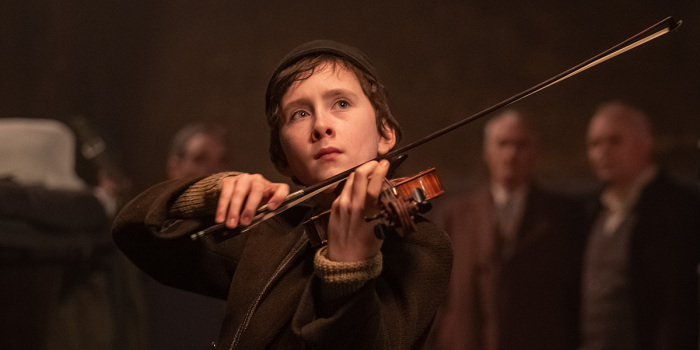In the Jewish faith, the Kaddish is known as the “mourner’s prayer,” intended to memorialize the deceased and affirm their place in their families and within their communities. But among the horrors of the Holocaust emerged some devastating practical problems: The names of the dead were too numerous to remember easily, and whole families were lost, leaving survivors with the difficult task of remembering them. François Girard’s “The Song of Names” is constructed around a musical solution to this dilemma, but it’s a fatally old-fashioned and lugubrious historical drama, muting the emotional payoff it labors so hard to deliver. Sony Pictures Classics will appeal to older audiences for a rollout starting Christmas Day, but the film may have trouble standing out among an especially crowded awards-season slate.
Much of the anticipation surrounding “The Song of Names” is Girard’s return to the classical-music mystery of his 1998 hit “The Red Violin,” which followed a single instrument through four centuries, five countries and an assortment of linked narratives. His approach mirrored the ingenious anthology of his 1993 curio “Thirty Two Short Films About Glenn Gould,” and both films revealed a passion and expertise for music and the difficult individuals who play it at its highest form. That would seem to make him the ideal candidate to wrestle with the story of a Polish violin prodigy who disappears like a ghost in the aftermath of World War II. There’s even a subplot about tracking down the origins of the instrument, which brings it further into Girard’s aesthetic wheelhouse.
Yet music is merely the impetus and the frame for a densely interwoven detective story that stretches across multiple timelines. In 1951 London, a young Polish Jew named Dovidl Rapoport is set to electrify an audience of critics, dignitaries and other members of the city’s upper crust, but he never shows and isn’t heard from again. Cut to 35 years later, when Dovidl’s childhood best friend Martin (Tim Roth), the son of a music publisher and benefactor, witnesses another young violinist mimic Dovidl’s distinct ritual for applying rosin to his bow. That inspires Martin, over the objections of his wife (Catherine McCormack), to follow the breadcrumbs all the way to Eastern Europe in an effort to find his old buddy and get some answers.
Screenwriter Jeffrey Caine (“The Constant Gardener”) then sets about telling two stories in parallel: In the late ’30s, Martin’s father agreed to take the preternaturally gifted (and supremely arrogant) Dovidl into his home to help develop his talent, and the two boys became roommates and inseparable chums in short order. In the ‘80s timeline, Martin searches doggedly for Dovidl, but when he turns up in the bedraggled form of Clive Owen, it becomes clear that he never wanted to be found. Still filled with anger and regret over Dovidl leaving him and his family without notice or explanation, Martin seeks answers and the fulfillment of a promise that wasn’t kept.
Though Roth and Owen give fine performances, as do the two pairs of children who play their characters at different ages, the soundtrack is the biggest star of “The Song of Names,” starting with a delicate original score by Howard Shore, the Oscar-winning composer of “The Lord of the Rings” and much of fellow Canadian David Cronenberg’s work. But while it makes sense for the film to withhold the musical wallop suggested by the title, much of “The Song of Names” is tangled up in a plodding period mystery that emphasizes handsome production values over hot-blooded emotion. Grief, rage, betrayal, genocide — these are not usually matters to be treated with such reserve.
When Girard finally arrives at the project Dovidl has been laboring over all these years, however, the film does land one scene of extraordinary power that nearly justifies the journey to get there. But even then, the bitterness Martin and his wife continue to harbor doesn’t make much sense: After all, the Dovidl of 1951 would be understandably preoccupied with his family’s well-being after the Holocaust and perhaps inclined to readjust his priorities from narcissistic violin prodigy to a man who takes his heritage more seriously. It’s a sign of the film’s priorities that it would rather follow Martin, a bourgeois assessor of up-and-coming talent, than Dovidl, who’s had to contend with unimaginable hardship and loss. “The Song of Names” would rather be respectable than wrenching.
Popular on Variety
Toronto Film Review: 'The Song of Names'
Reviewed at Toronto Film Festival (Gala Presentations), Sept. 8, 2019. Running time: 113 MIN.
Production:(Canada) A Sony Pictures Classics release of a Serendipity Point Films, Lyla Films production. Producers: Robert Lantos, Lyse Lafontaine, Nick Hirschkorn. Executive producers: Mark Musselman, Randy Lennox, Peter Touche, Stephen Spence, Tibor Krsko, Anant Singh.
Crew:Director: François Girard. Screenwriter: Jeffrey Caine. Camera (color, HD): David Franco. Editor: Michel Arcand. Music: Howard Shore.
With:Tim Roth, Clive Owen, Catherine McCormack, Jonah Hauer-King, Gerran Howell, Luke Doyle, Misha Handley.
Source: Read Full Article
